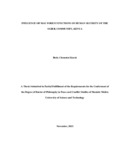Please use this identifier to cite or link to this item:
http://ir-library.mmust.ac.ke:8080/xmlui/handle/123456789/2627| Title: | INFLUENCE OF MAU FOREST EVICTIONS ON HUMAN SECURITY OF THE OGIEK COMMUNITY, KENYA |
| Authors: | Chemutai Koech, Betty |
| Keywords: | Mau Forest Ogiek community Evictions |
| Issue Date: | 2023 |
| Abstract: | Protected areas such as national parks, conservation zones, and nature reserves are globally defined so by governments primarily to preserve the natural environment for the benefit of flora and fauna, that is, for the public good. Eviction of Forest communities is a result of this endeavour and the Ogiek, a forest community in the Mau Forest complex in Kenya, is a victim to this. The government declared the forest a protected area and hence evicting them contrary to the Constitution that gives all Kenyans regardless of where they live, fundamental rights and freedom, guaranteeing their human security. The evictions raise the question of what happens to the evictees’ human security. It is against this backdrop that this study had a general objective of interrogating the influence of Mau Forest evictions on the human security of the Ogiek community. The specific objectives were to examine the nature of Mau Forest evictions, assess the effects of Mau Forest evictions on Human Security of the Ogiek community and, examine the Challenges and Opportunities resulting from the evictions of the ogiek community from Mau forest. Public interest and human needs theories underpinned the study. The study used descriptive research design and had a sample of 472 respondents who included 384 household heads, 1 County Commissioner, 2 Sub-County Commissioners, 1 UNEP representative, 1 UN Habitat representative, 1 Director, National Environment Management (NEMA), 3 Kenya Water Towers Authority officers, 10 Kenya Forest Service (KFS) officers, 10 Kenya Wildlife Service (KWS) officers, 7 Chiefs, 32 Village elders, 5 NGO heads, 5 CBO heads and 10 Police officers. The study applied simple random and purposive sampling techniques. Interviews, questionnaires, Focus Group Discussions and observation were used to collect primary data. Secondary data was gathered from published and non published works. SPSS version 26 was used to analyse quantitative data and presented in tables, graphs, and charts. Narratives and verbatim quotations were used to present the qualitative data. The study found that 99% of the respondents were original residents, 88% experienced inhumane, brutal forced evictions. Another 28% received eviction notices, 72% did not, and 80% of evictions involved police brutality and 77% shelter destruction. The data revealed that the Mau forest evictions had negative effects on Ogieks’ human security, including deaths (86%), injuries (97%), destruction of homes (98%), farms (80%), livestock (52%), illness (95%), lack of sanitation (92%), gender-based violence (69%), disruption of schooling (100%), loss of culture (94%), separation from family (88%), loss of livelihoods (98%), and increased human-wildlife conflicts (78%), and 100% of respondents feared for their safety. The research revealed that the evictions present challenges and opportunities for both the Ogiek and the government. The top five challenges ranked in order of percentage are Psychological challenges (100%), Communication challenges (100%), Technological challenges (100%), Cultural preservation challenges (100%), and Governance and administrative challenges (100%). The second highest-ranked challenges are economic, health, educational, human rights, and political challenges, with a 99% agreement rate. The study concludes that although the evictions have compromised the human security of the Ogiek community by causing them to lose their homes, property, and livelihoods and expose them to environmental, climatic, and social danger, there is still a chance for the community to benefit from adapting contemporary ways of life. The study recommends a clear and transparent guidelines regarding evictions, and further reckons that, the government adopts a more humane and sustainable relocation policy by providing alternative ways of livelihood to the victims. |
| URI: | http://ir-library.mmust.ac.ke:8080/xmlui/handle/123456789/2627 |
| Appears in Collections: | School of Disaster Management and Humanitarian Assistance |
Files in This Item:
| File | Description | Size | Format | |
|---|---|---|---|---|
| Chem Koech.pdf | 4.24 MB | Adobe PDF |  View/Open |
Items in DSpace are protected by copyright, with all rights reserved, unless otherwise indicated.
